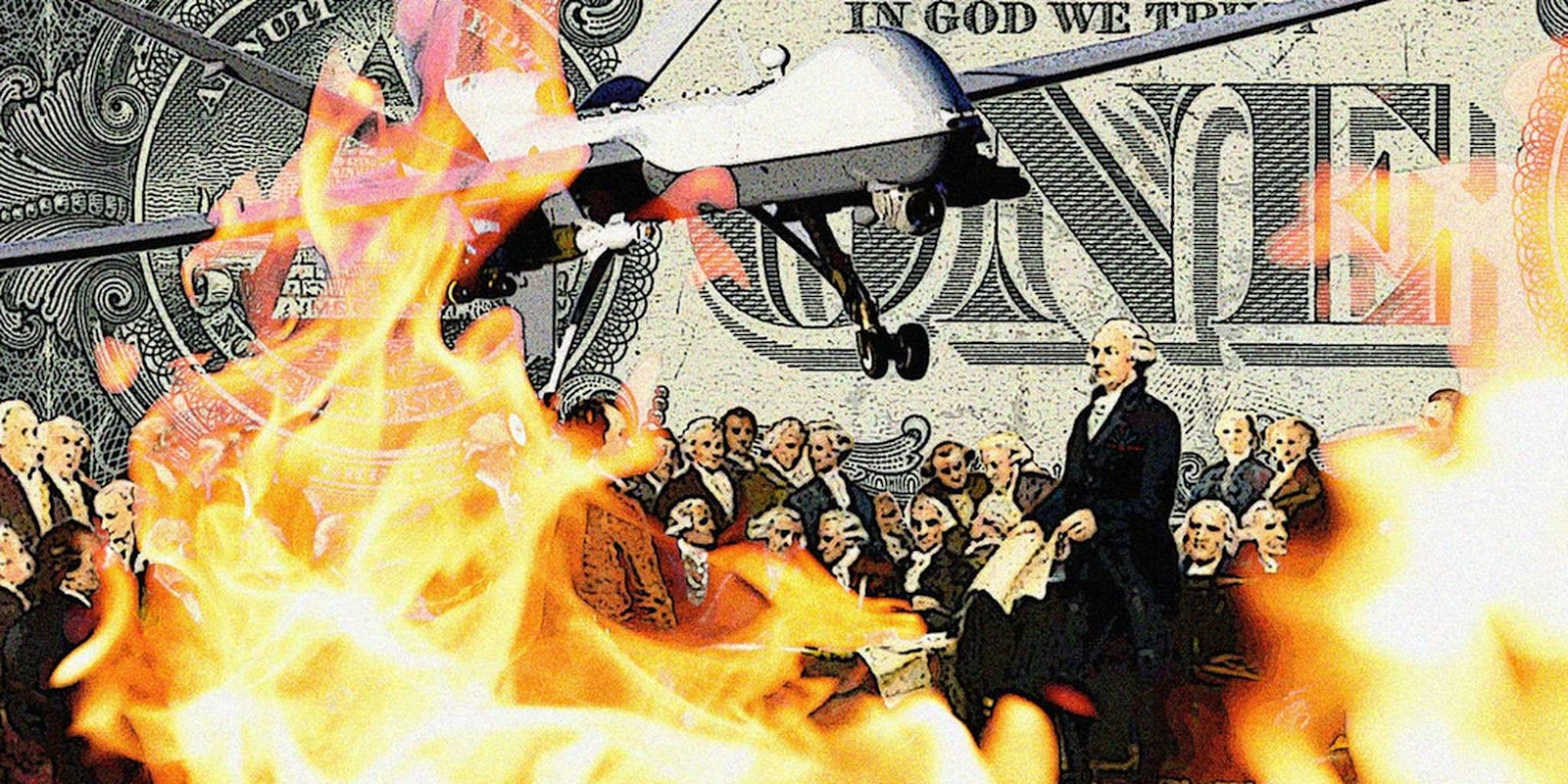Twelve years after the start of the Iraq War, Americans seem to have increasingly gotten over our supposed “war weariness.” Nearly every poll has a majority of Americans supporting the president’s proposed use of ground troops against ISIS, a shift in political opinion most likely fueled by the terrorist group’s violent and widespread PR campaign. The public can only see so many headlines about beheaded journalists and teenage sex slaves before they begin to wonder what ever happened to the force of America’s moral standard.
The drastic increase in drone strikes on foreign targets has become the worst kept secret war in history.
Unlike the fight against ISIS, the drastic increase in drone strikes on foreign targets has become the worst kept secret war in history, one that is proving wildly popular with the public. According to a recent AP-GfK poll, six out of every 10 Americans support the use of drone strikes against terrorist organizations. Seventy-five percent of those who support drone strikes maintain their support even if the target is an American citizen, and 47 percent support drone strikes that might take out a few civilians. America’s love of drones crosses party lines, too: 7 in 10 Republicans support them, compared to 6 in 10 Democrats.
The heavy use of drones has been a major component of Obama’s fight to sustain a “small footprint” in finding and capturing or killing terrorists. The advantages are obvious: Drones allow the Pentagon and intelligence agencies to take military action, while completely avoiding the expensive and nasty business of nation-building. However, the program has also proved controversial abroad: Drones have killed hundreds of civilians, many of them children, and have fermented even more hatred of the U.S. in countries like Pakistan and Yemen.
The widespread support among Americans of this program, which likely inspires more terrorists than it kills, comes from the same instinct that makes a war against ISIS so popular. The optics of war are very traumatic for most Americans—we prefer wars to be short, simple, and as far away from us as possible. The Iraq War had 72 percent support among American public at its 2003 inception, in part because it was sold as a short military endeavor, billed in the immortal words of Secretary Donald Rumsfeld as lasting “six days, six weeks, I doubt six months.”
Even in the darkest days of the Iraq War, the sacrifice asked of the average American was basically nil. As one famous slogan passed among U.S. service member stated, “America isn’t at war. The Marine Corps is at war. America is at the mall.”
We prefer wars to be short, simple, and as far away from us as possible.
Unlike the Bush administration’s false sales pitch, drones really are a quick war—for Americans. They spare us from expensive military campaigns, while still offering the peace of mind that the good guys will prevail. For innocent civilians across the globe, however, drones offer an almost mythical state of fear of literal death from above. Drones fulfill the stereotype of America as a privileged nation with little connection to the consequences of its actions, killing people from the comfort of a Nevada air base.
In Pakistan, where America’s drone program has killed upwards of 400 civilians, 74 percent of citizens disapprove of the United States, and the only ones who do approve have never heard of the drone program. Far from being the “targeted killings” Bush and Obama administration officials have sold the public, drones are wildly inaccurate—and civilian deaths are an almost certainty. According to the human rights group Reprieve, the U.S. killed 1,147 people in attempts on only 41 people. Just last week, the Obama administration had to defend its actions after a Wall Street Journal report told of how a drone strike in Pakistan killed two Taliban hostages—one an American and one an Italian.
While drone strikes do make the occasional headline—Rand Paul’s old-school filibuster on the matter captured cable news and social media nearly two years ago—they are mostly left off the front pages. The less we hear about the costs of something, the more likely we are to support it. Drone strikes excel at meeting this demand by being cheap, swift, and leaving soldiers at home. They remove nearly every toll a war can have on a people, except for its troubling psychological toll.
This is particularly true of drone pilots. According to a 2013 Defense Department study, drone pilots who had taken action against targets were as likely to develop Post Traumatic Stress Disorder and other syndromes as soldiers who serve abroad. This level of stress might be leading Air Force officers to quit, straining the drone program altogether. According to the Daily Beast, “officer outflow” has limited pilots and put the entire drone program at a “breaking point.”
The less we hear about the costs of something, the more likely we are to support it.
Of course, we’re typically pretty good at ignoring the struggles of veterans with mental illness who did serve abroad, so it’s likely not even this local costs will change American opinions on the matter. Our love of drones comes from a deep-seated desire to keep war as far away from our shores and our own minds as possible. One of the great narratives of American culture since September 11 is the desperate attempt to regain the invulnerability we once felt before the attacks.
ISIS brought brutality and barbarism to our Twitter feeds (and possibly to the heart of Texas), so we want them eradicated. Drones keep the vicious consequences of our security private and inexpensive, so we want them everywhere.
Gillian Branstetter is a social commentator with a focus on the intersection of technology, security, and politics. Her work has appeared in the Washington Post, Business Insider, Salon, the Week, and xoJane. She attended Pennsylvania State University. Follow her on Twitter @GillBranstetter.
Photo via AK Rockerfeller/Flickr (CC BY 2.0)


